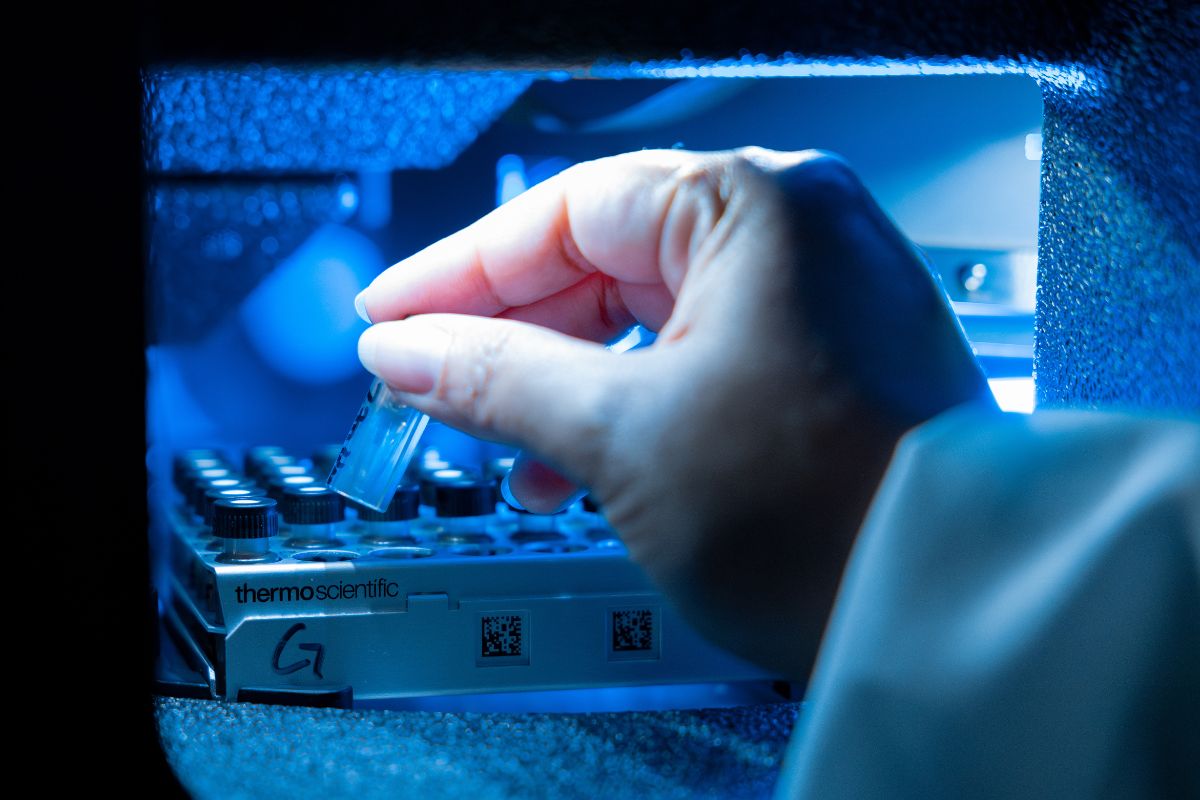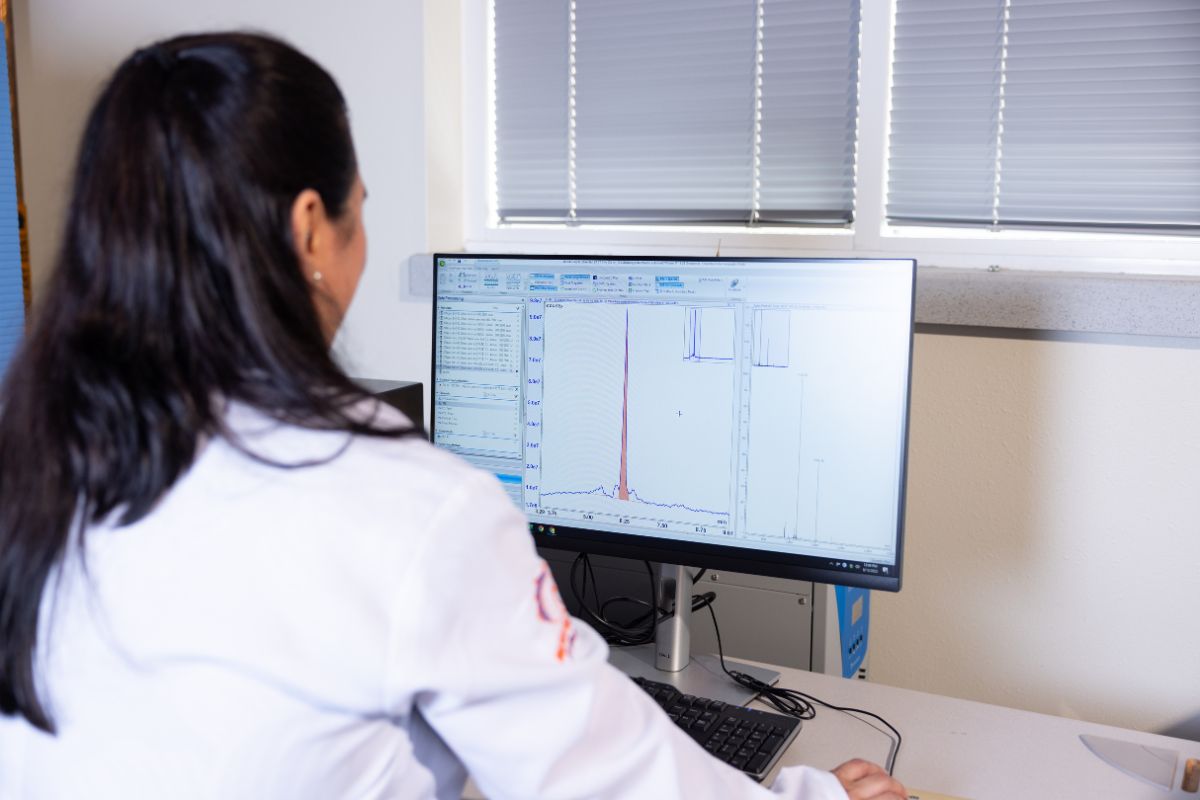UTA student’s research earns international recognition
Monday, Aug 25, 2025 • Drew Davison : Contact
.jpg?revision=232727bd-2bd7-4f4f-8b11-60d5c8bebb2b)
There’s no better feeling for a professor than seeing a student’s work get recognized. Just ask Daniel Armstrong, the Robert A. Welch Distinguished Professor in Chemistry at The University of Texas at Arlington.
He called it “terrific” when doctoral student Maria Olds’ research on chromatography and blood alcohol was recently featured in LCGC International, an internationally recognized magazine.
“This is one of the main reasons we do what we do,” Dr. Armstrong said. “Maria is a great example for all other students. You can tell other students, ‘Look at what she’s done. Now, you should try to do this, too.’”
Olds is the latest standout student from UT Arlington—a Carnegie R1 research institution—whose work has gained notable recognition. She chose UTA for its strong research programs, including Armstrong’s renowned chromatography lab. Chromatography is a laboratory technique scientists use to separate and analyze the components of a mixture—such as impurities that cause side effects in pharmaceuticals or the sugars, electrolytes and dyes in a sports drink.

Related: Rare achievement: UTA undergrad publishes research
Olds’ research investigated how various pre-analytical factors such as storage temperatures and delays could affect the accuracy of blood alcohol tests. The research initially started when she was working at the Fort Worth Police Department Crime Laboratory as a seized-drug analyst and blood alcohol toxicologist.
For decades, the Fort Worth Police has used 6-milliliter tubes instead of the more common 10-milliliter tubes to store blood alcohol tests, a practice that has sparked courtroom questions about the accuracy of the tests. Olds conducted a thorough investigation into how the two tube types responded under varying conditions and time delays, ultimately discovering that the 6-milliliter tubes were just as appropriate for testing as the 10-milliliter tubes.
In the end, the study confirmed that blood tests collected by the Fort Worth Police Department Crime Laboratory were highly reliable.

“I wanted to determine whether what we had been doing for decades at that point was valid,” said Olds, who started on her doctoral studies at UTA in 2023. “We would have made changes if the tubes we were using weren’t fit for use, but we were able to show that they were.”
Before coming to UTA, Olds worked as a chemist for 17 years, including positions at MRIGlobal in Kansas City as well as the Fort Worth Police Department Crime Laboratory. Her passion, though, has always been research, and she’s fulfilling it as part of UTA’s Department of Chemistry and Biochemistry and Armstrong’s lab.
“Pursuing a doctoral degree is one of the most difficult things I’ve ever done but, at the same time, it’s one of the most rewarding things I’ve ever done,” said Olds, who is on track to earn her doctorate by 2028. “You’re never really done learning. I really enjoy being here at UTA and learning about different branches of chemistry I hadn’t planned on learning about.”
About The University of Texas at Arlington (UTA)
Celebrating its 130th anniversary in 2025, The University of Texas at Arlington is a growing public research university in the heart of the thriving Dallas-Fort Worth metroplex. With a student body of over 41,000, UTA is the second-largest institution in the University of Texas System, offering more than 180 undergraduate and graduate degree programs. Recognized as a Carnegie R-1 university, UTA stands among the nation’s top 5% of institutions for research activity. UTA and its 280,000 alumni generate an annual economic impact of $28.8 billion for the state. The University has received the Innovation and Economic Prosperity designation from the Association of Public and Land Grant Universities and has earned recognition for its focus on student access and success, considered key drivers to economic growth and social progress for North Texas and beyond.
Latest News
- Experts explore AI’s future in health care at UTAFifth annual Texas Health Informatics Alliance Conference spotlights ethical, responsible AI
- Students turn research into award-winning venturesTop prizes at MavPitch go to projects on advanced wound care and sustainable carbon tech
- Curtains rise on UTA’s daring theater seasonStudents take the lead in a season of ambitious productions, from a Shakespeare-inspired drama to Tony-winning musicals
- The Long History of The ShorthornUTA’s student newspaper is almost as old as the University itself. Yet its student-journalists remain driven by the same desire as those who published the very first issue: to tell the important stories of the campus and its community.
- Who let the dogs talk?UTA computer scientist Kenny Zhu shares encouraging early results of research into canine vocalizations
- New flood maps, data aim to protect Texas communitiesUTA researcher leads study showing how tracking floodplain changes can guide recovery and build resilience






